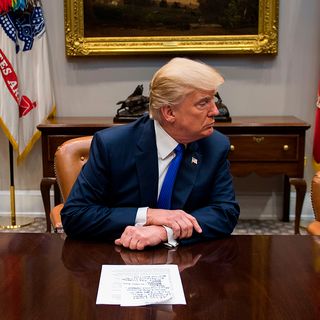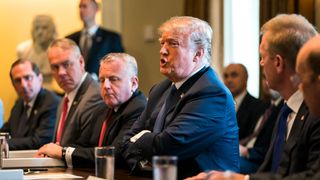As the United States and China escalate their trade war, the costs of rising tariff protection loom increasingly large for the world economy. But these costs are just the start of the economic fallout. The economic uncertainty generated by an open-ended trade war is also weighing on cross-border investment.
Foreign direct investment (FDI) in the United States recorded a $US8.2 billion ($11.4 billion) outflow in the second quarter of 2018. Outflows of FDI are a rare event for a capital-importing country like the US, even at a quarterly frequency.
State of confusion: How policy uncertainty harms international trade and investment

FDI in the US fell from a record $US486 billion in 2016 to $292 billion in 2017, a 40 per cent decline. While inward FDI globally declined by 23 per cent over the same period, this still leaves the United States underperforming in attracting long-term investment from abroad.
President Donald Trump hopes his rising tariff wall will motivate US and foreign businesses to increase their investment and production in the United States. But the uncertainty generated by the trade war is only likely to harm long-term investment, particularly on the part of foreign investors, who are wary of the potential disruption to global supply chains.
The data are already contradicting one of the main rationales for Trump's tariffs.
Thanks to the Economic Policy Uncertainty Index developed by Scott Baker, Nicholas Bloom and Steven Davis, we can quantify this uncertainty and its economic effects on the United States, Australia and the world.
More cautious
In January 2017, as the newly elected president pulled the US out of the Trans-Pacific Partnership, the Global Economic Policy Uncertainty Index was higher than during the Asian crisis, the September 11, 2001, terrorist attacks, the 2008-09 global financial crisis and the 2011 European debt crisis.
In an environment of increased uncertainty, business, investors and consumers become more cautious. Investment spending is particularly vulnerable because uncertainty increases the option value of delaying investment decisions.
Investment spending is also a major driver of international trade, which is dominated by trade in intermediate and capital goods.
In my report, State of Confusion, I quantify the effects of economic policy uncertainty on trade and cross-border investment for the US and Australia. Consistent with other researchers, I find that foreign direct investment is very sensitive to policy uncertainty. A one standard deviation increase in US economic policy uncertainty reduces FDI in the US by 2.6 per cent after three quarters.
In January 2017, as the newly elected president pulled the US out of the Trans-Pacific Partnership, the Global Economic Policy Uncertainty Index was higher than during the Asian crisis, the September 11, 2001, terrorist attacks, the 2008-09 global financial crisis and the 2011 European debt crisis.
While there are other factors at work, not least the substance of the economic and trade policies actually implemented, uncertainty is itself costly and has powerful cyclical effects.
The US Economic Policy Uncertainty Index has a strong and statistically significant correlation with the Australian index, with a coefficient of 0.70. By contrast, China's index has a correlation with Australia's of only 0.39. While China figures prominently in Australia's exports, the much deeper level of integration between the Australian and US economies through cross-border investment and capital flows means that US economic policy is a more important influence on policy uncertainty in Australia.
The good news is that the Australian economy appears to be relatively resilient to economic policy uncertainty, whether at home or abroad. My research shows that such uncertainty is mainly borne by declines in the Australian dollar real effective exchange rate, real interest rates and foreign portfolio investment flows. Australia's floating exchange rate and financial markets adjust to insulate us from some of the consequences of policy uncertainty. The US does not benefit from the same exchange rate adjustment.
Bipartisan support
Australia's international trade, foreign direct investment and gross national expenditure do not show statistically significant responses to economic policy uncertainty shocks, which is not to say these variables cannot be harmed by the substance of economic policy.
The Debate Papers: Will the global trading system survive President Trump’s tariffs?

However, we should not be complacent. Other researchers have found that policy uncertainty weighs more heavily on economic activity during an economic downturn. Because there has not been a conventionally defined recession in the sample period covered by the Australian Economic Policy Uncertainty Index, we cannot be confident that the local economy will be as resilient to policy uncertainty in a future downturn.
Just as there are costs associated with increased policy uncertainty, there are economic benefits from reducing uncertainty. These benefits can be captured by adhering to well-defined, transparent and rules-based policy frameworks. Bipartisan support for these frameworks can reduce the uncertainty that would otherwise arise from elections and changes in government. Bilateral, plurilateral and multilateral trade agreements can also reduce uncertainty about international trade and investment.
By promoting a rules-based order at home and abroad, Australian policymakers can contribute to increased certainty for business, investors and consumers, and capture significant economic benefits.




.jpg?rect=0,80,3000,1989&fp-x=0.5&fp-y=0.44772296905517583&w=320&h=212&fit=crop&crop=focalpoint&auto=format)

